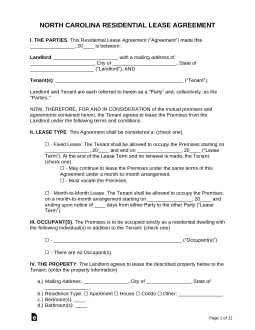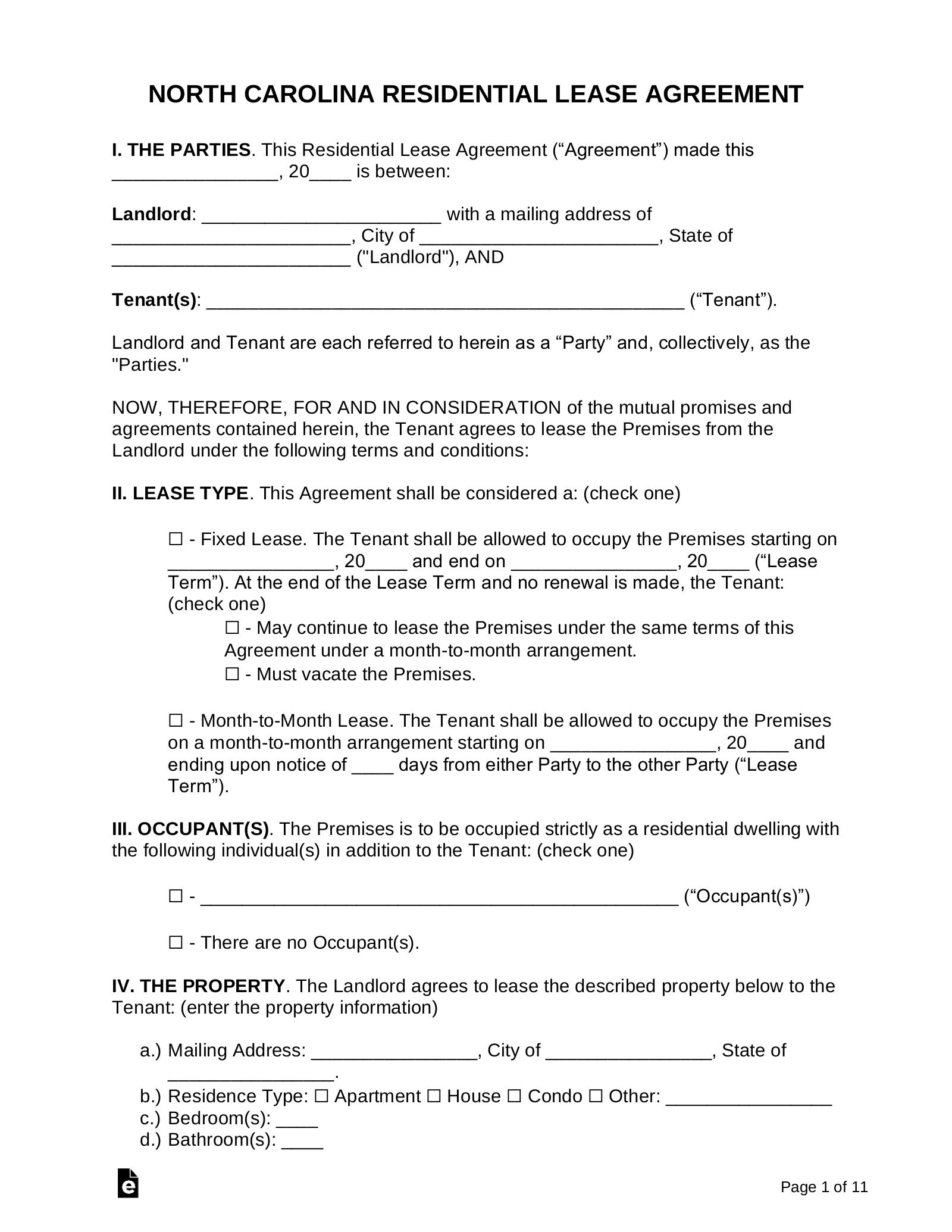Updated February 07, 2024
A North Carolina lease agreement is a contract created for the renting of property between a landlord and tenant. The agreement may be used for residential or commercial purposes and, once signed, becomes legally binding to both parties.
Table of Contents |
Agreement Types (7)
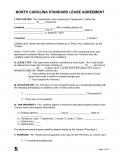 Standard Residential Lease Agreement – Provided by the Apartment Association of North Carolina for fixed tenancies of one year. Standard Residential Lease Agreement – Provided by the Apartment Association of North Carolina for fixed tenancies of one year.
Download: PDF, MS Word, OpenDocument |
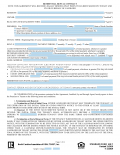 Association of Realtors – A standard lease provided by the North Carolina Association of Realtors to be used by a licensed realtor. Association of Realtors – A standard lease provided by the North Carolina Association of Realtors to be used by a licensed realtor.
Download: PDF |
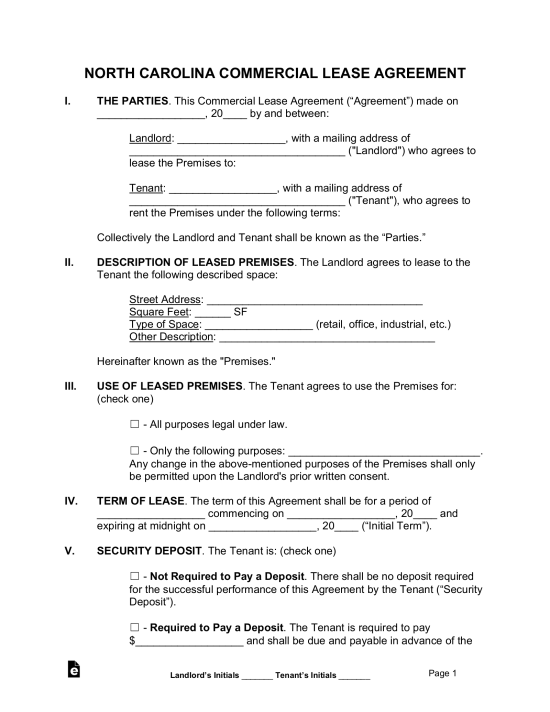 Commercial Lease Agreement – For space that is utilized for a professional service or retailer. Commercial Lease Agreement – For space that is utilized for a professional service or retailer.
Download: PDF, MS Word, OpenDocument |
 Lease with Option to Purchase Agreement – Standard form that also allows the chance for the tenant to buy the property on agreed-upon terms from the landlord. Lease with Option to Purchase Agreement – Standard form that also allows the chance for the tenant to buy the property on agreed-upon terms from the landlord.
Download: PDF, MS Word, OpenDocument |
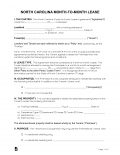 Month-to-Month Lease Agreement – Under North Carolina law, a tenant may terminate this type of tenancy with at least seven days’ notice. Month-to-Month Lease Agreement – Under North Carolina law, a tenant may terminate this type of tenancy with at least seven days’ notice.
Download: PDF, MS Word, OpenDocument |
 Room Rental (Roommate) Agreement – A form that binds the individuals sharing a common housing structure to tasks, such as cleaning, and how much each shall have to pay for bills, rent, etc. Room Rental (Roommate) Agreement – A form that binds the individuals sharing a common housing structure to tasks, such as cleaning, and how much each shall have to pay for bills, rent, etc.
Download: PDF, MS Word, OpenDocument |
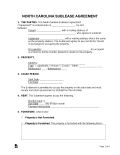 Sublease Agreement – The act of a tenant letting someone else use their property until the end of their term on the property. Sublease Agreement – The act of a tenant letting someone else use their property until the end of their term on the property.
Download: PDF |
Required Disclosures (2)
- Lead-Based Paint Disclosure – Federal law requires all landlords and managers of residential units constructed before 1978 to provide their tenants with this disclosure document. Every tenant mentioned in the lease must sign the form.
- Security Deposit Receipt – Within 30 days of the start of the lease term, the landlord must provide the tenant with a receipt for the security deposit, containing the name and address of the financial institution where it is being held.[1]
Security Deposits
Maximum Amount – For leases longer than two months, the landlord can charge up to two months’ rent for a security deposit. For month-to-month tenancies, only one and a half months’ rent can be requested.[2]
Collecting Interest – North Carolina state law does not require the landlord to collect or pay interest on the tenant’s security deposit.
Receipt – The landlord must provide a receipt for the security deposit within 30 days of the start of the lease. The receipt must disclose the name and address of the financial institution where the funds have been deposited.[1]
Pet Fee – The landlord may charge a reasonable, nonrefundable fee for any pets the tenant plans to keep on the premises.[3]
Returning – The landlord must return the security deposit to the tenant within 30 days of the end of tenancy. If there is damage to the unit, the landlord may give written notice within this period that an additional 30 days is needed to estimate the cost of repairs.[4]
- Itemized List – If any portion of the security deposit is withheld to cover the costs of damages, the landlord must provide the tenant with an itemized list of damages in writing within 30 days of the end of the lease term.[4]
When is Rent Due?
Grace Period – A late fee may not be assessed until rent is at least five days late.[5] If rent is not paid on the sixth day, the landlord can charge a late fee and start the eviction process by sending the tenant a 10-day notice to quit.
Maximum Late Fee – The landlord can charge a maximum late fee of $15 or 5% of the monthly rent, whichever is greater.[6]
NSF Fee – If the tenant pays with a bad check, the maximum allowable fee that can be charged is $35.[7]
Withholding Rent – A tenant may not withhold rent to cover the costs of necessary repairs unless a court has given them permission to do so.[8]
Right to Enter (Landlord)
There are no statewide laws or statutes in North Carolina regarding a landlord’s right to enter the property while it is occupied. However, it is recommended that the landlord give the tenant written notice before entering for maintenance or general repairs.
Abandonment
Absence – North Carolina state law does not establish a specific length of time that a tenant must be absent before the property can be considered abandoned.
Breaking the Lease – A tenant may terminate the lease early if they are a military technician who is required to relocate,[9] a victim of domestic violence, sexual assault, or stalking,[10] or a resident of a foreclosed property.[11]
Tenant’s Utility Shutoff – The tenant is required to maintain utilities insofar as such maintenance is required by applicable building and housing codes.[12]
Unclaimed Property – The landlord must retain any abandoned personal property for at least seven days, or five days if the property is worth less than $500, following the execution of a writ of possession. After this time, they may dispose of the property.[13]

